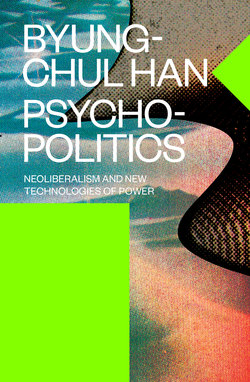Читать книгу Psychopolitics - Byung-Chul Han - Страница 10
На сайте Литреса книга снята с продажи.
3. The Mole and the Snake
ОглавлениеDisciplinary society consists of settings and institutions of confinement. The family, schools, prisons, barracks, hospitals and factories all represent disciplinary spaces that confine. The disciplinary subject changes from one milieu of confinement to the next. In so doing, it moves within a closed system. The inhabitants of milieus of confinement can be ordered in space and time. The animal of disciplinary society is the mole.
In his ‘Postscript on the Societies of Control’, Deleuze diagnoses a general crisis affecting all milieus of confinement.1 Their closedness and rigidity pose a problem: they are no longer suited to post-industrial, immaterial and networked forms of production. The latter push for more openness by breaking borders down. But the mole cannot bear such openness. Accordingly, the snake takes the mole’s place. The snake is the animal of neoliberal control society, to which disciplinary society has yielded. In contrast to the mole, the snake does not move in closed spaces. Rather, it makes space by means of its own movement. The mole is a labourer. In contrast, the snake is an entrepreneur. The snake is the animal of the neoliberal regime.
The mole moves through predetermined spaces; as such, it subordinates itself to spatial restrictions. The mole is a subjugated subject. But the snake is a project inasmuch as it creates space through the course it steers. The passage from the mole to the snake – from subject to project – does not amount to setting out for an entirely new way of life; instead, it represents a mutation, indeed an intensification, of capitalism, which remains one and the same. The mole’s restricted movements impose limits on productivity. Even when it labours in disciplined fashion, it cannot exceed a certain level of productivity. The snake eliminates such limitations through new forms of movement. Accordingly, the capitalist system is switching from the mole-model to the snake-model in order to generate more productivity.
According to Deleuze, the disciplinary regime organizes itself as a ‘body’. It is a biopolitical regime. The neoliberal regime, in contrast, seems like a ‘soul’.2 As such, psychopolitics is its form of government: it is ‘constantly introducing an inexorable rivalry presented as healthy competition … wonderful motivation’.3 Motivation, projects, competition, optimization and initiative represent features of the psychopolitical technology of domination that constitutes the neoliberal regime. Above all, the snake embodies the guilt and debts (die Schuld, die Schulden) that the neoliberal regime employs as instruments of domination.
